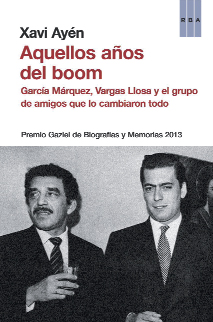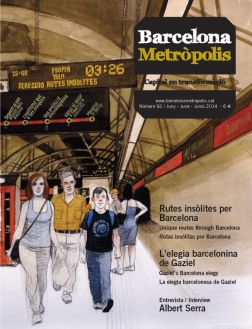 Aquellos años del boom
Aquellos años del boom- [Those Boom Years]
- 2013 Gaziel Biographies and Memoirs Prize
- By: Xavi Ayén
- RBA Barcelona, 2014
- 800 pages
Cities are made by what they forget and the journalist Xavi Ayén was troubled because in his Barcelona there remained no trace of the most important 20th-century literary movement in Spanish. The Latin American boom was multifaceted, with as many capitals as nationalities among its authors, but it is undeniable that they all spent some decisive years in Catalonia. Here Gabriel García Márquez learned to handle his international fame and set about writing his most ambitious novel, The Autumn of the Patriarch. Here Mario Vargas Llosa experienced the rise and fall of his revolutionary passion. And here the literary agent Carme Balcells gave meaning and direction to what, in other circumstances, would have been a group of dysfunctional geniuses – forgive the repetition – adrift.
Aquellos años del boom earned Xavi Ayén the Gaziel Biographies and Memoirs Prize in 2013, a lucky but necessary conclusion to the research he had been carrying out intermittently for ten years. In almost a thousand pages the journalist shows a data handling precision and thorough documentation that will come as no surprise to those used to reading his work in the book section of La Vanguardia, although it might be more important to say that a thousand pages does not always mean a hefty tome.
The book covers the period from 1967 to 1975 so, in one sense, it is the history of a city stirring before a cracking Franco regime. The years of the gauche divine, nights at the Bocaccio, summer houses in Cadaqués. This was the Barcelona that the Latin American writers landed in, to work in peace, far away from the political convulsions of their own countries, and Ayén conducts an exercise in imagined nostalgia passing through the restaurants, bread shops, nurseries and houses where, at one time, they lived.
Alongside this urban perspective, Aquellos años del boom is the story of encounters: the meeting of the two Nobel Prize winners of that generation and the broad network of exiled writers who arrived here with them. The Chilean José Donoso, the Peruvian Alfredo Bryce Echenique, the Mexican Sergio Pitol. Others who were just passing through, for example, the Argentinian Julio Cortázar, the Mexican Carlos Fuentes and the Cuban Guillermo Cabrera Infante. And yet others, the majority, who remained anonymous, searching the city for that magic vein that would give them the success of the rest.
Ayén’s biggest achievement is to have understood from the beginning that this should not to be a critical analysis but the sum of human stories, so that, in reconstructing them from the tetsimony of witnesses, letters and memoirs, Aquellos años del boom shows how, for the first time, circumstances combined in Barcelona to allow a group of unlikely friends to come together to celebrate the fact that they were changing the history of literature. They were celebrating but, obviously, they still did not know it. Because they were young and the world would have to be shattered in so many ways in the following decades.



